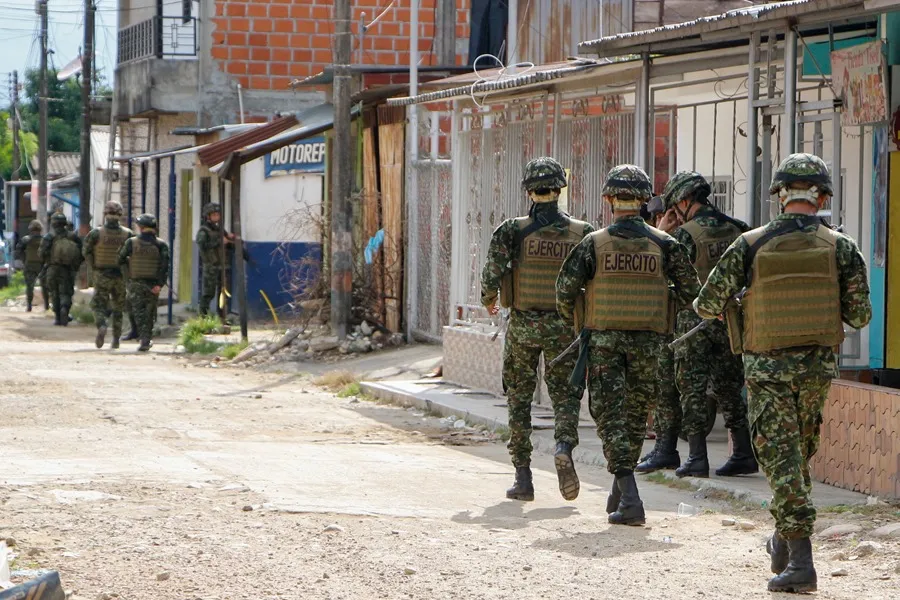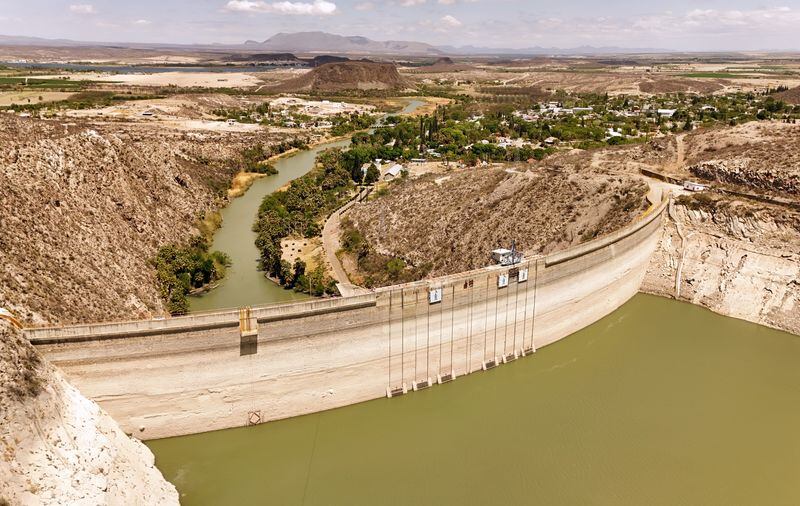International
Commissioner recognizes that the Government of Colombia did not analyze an alert of violence in the Catatumbo

The Commissioner of the Peace of Colombia, Otty Patiño, acknowledged on Monday that the Government did not analyze the early warning issued last year by the Ombudsman’s Office about a possible confrontation between the National Liberation Army (ELN) and a FARC dissident in the Catatumbo region, as has been the case since January 16.
“What was noticeable through the alerts was an exacerbation of the conflict. There was not, and I want to be very self-critical, an in-depth analysis of why that exacerbation of the confrontations between those who had a situation of coexistence, between what they call (…) the Front 33, and the ELN in that region,” said Patiño.
Patiño participated in a technical session of the unconstitutional state of affairs (ECI) of the security guarantees to the signatories of the Peace Agreement, organized by the Constitutional Court, in which they talked about what is happening in the Catatumbo, a region located in the department of Norte de Santander, since the guerrilla violence has left at least six FARC ex-combatants killed.
The humanitarian and security crisis in Catatumbo was something announced by various authorities, including the Ombudsman’s Office, which on November 15 warned, through its early warning system, of “the risk situation” for the civilian population due to the presence and threats of illegal armed groups.
Since January 16, the clashes between the ELN guerrillas and the 33rd Front of the FARC dissidents in the Catatumbo have left between 60 and 80 dead according to the counts of the Ombudsman’s Office and the Government of Norte de Santander, while the number of displaced people is more than 50,000 people.
However, the authorities have only been able to collect 47 bodies due to the situation that the most remote rural areas continue to experience, where the authorities have not yet been able to access.
In addition, it became known that a humanitarian commission, led by the Catholic Church, the UN Mission in Colombia and the Ombudsman’s Office, will address the crisis in the Catatumbo region (border with Venezuela), caused by guerrilla violence that since January 16 has left at least 47 dead.
The Ombudsman’s Office detailed on Monday that the objective is to “address the situation in the Catatumbo region, in order to improve the lives of people in vulnerable situations” due to the clashes between the guerrillas of the National Liberation Army (ELN) and the 33rd Front of the FARC dissidents in that region of the department of Norte de Santander.
“The Northeast War Front of the ELN has committed to respecting the actions of the humanitarian commission,” the agency added.
International
U.S. and Mexico Reach Deal to Address Water Deficit Under 1944 Treaty

The United States and Mexico have reached an agreement to comply with current water obligations affecting U.S. farmers and ranchers and for Mexico to cover its water deficit to Texas under the 1944 Water Treaty, the U.S. Department of Agriculture said in a statement.
The department уточified that the agreement applies to both the current cycle and the water deficit from the previous cycle.
On Monday, U.S. President Donald Trump accused Mexico of failing to comply with the water-sharing treaty between the two countries, which requires the United States to deliver 1.85 billion cubic meters of water from the Colorado River, while Mexico must supply 432 million cubic meters from the Rio Grande.
Mexico is behind on its commitments. According to Washington, the country has accumulated a deficit of more than one billion cubic meters of water over the past five years.
“This violation is severely harming our beautiful crops and our livestock in Texas,” Trump wrote on Monday.
The Department of Agriculture said on Friday that Mexico had agreed to supply 250 million cubic meters of water starting next week and to work toward closing the shortfall.
Agriculture Secretary Brooke Rollins, quoted in the statement, said Mexico delivered more water in a single year than it had over the previous four years combined.
Trump has said that if Mexico continues to fall short of its obligations, the United States reserves the right to impose 5% tariffs on imported Mexican products.
Mexico’s Deputy Foreign Minister for North America, Roberto Velasco, said that a severe drought in 2022 and 2023prevented the country from meeting its commitments.
International
Several people shot in attack on Brown University campus

Several people were shot on Saturday in an attack on the campus of Brown University, in the northeastern United States, local police reported.
“Shelter in place and avoid the area until further notice,” the Providence Police Department urged in a post on X. Brown University is located in Providence, the capital of the state of Rhode Island.
U.S. President Donald Trump said on his social media platform Truth Social that he had been briefed on the situation and that the FBI was on the scene.
At 5:52 p.m. local time (11:52 p.m. GMT), Brown University said the situation was still “ongoing” and instructed students to remain sheltered until further notice.
After initially stating that the suspect had been taken into custody, Trump later posted a second message clarifying that local police had walked back that information. “The suspect has NOT been apprehended,” the U.S. president said.
International
Colombia says it would not reject Maduro asylum request as regional tensions escalate

The Colombian government stated on Thursday that it would have no reason to reject a potential asylum request from Venezuelan President Nicolás Maduro should he leave office, as regional tensions persist over the deployment of U.S. military forces in the Caribbean since August.
“In the current climate of tension, negotiations are necessary, and if the United States demands a transition or political change, that is something to be assessed. If such a transition results in him (Maduro) needing to live elsewhere or seek protection, Colombia would have no reason to deny it,” said Colombian Foreign Minister Rosa Villavicencio in an interview with Caracol Radio.
However, Villavicencio noted that it is unlikely Maduro would choose Colombia as a refuge. “I believe he would opt for someplace more distant and calmer,” she added.
Colombian President Gustavo Petro also commented on Venezuela’s situation on Wednesday, arguing that the country needs a “democratic revolution” rather than “inefficient repression.” His remarks followed the recent detention and passport cancellation of Cardinal Baltazar Porras at the Caracas airport.
“The Maduro government must understand that responding to external aggression requires more than military preparations; it requires a democratic revolution. A country is defended with more democracy, not more inefficient repression,” Petro wrote on X (formerly Twitter), in a rare public criticism of the Venezuelan leader.
Petro also called for a general amnesty for political opponents and reiterated his call for forming a broad transitional government to address Venezuela’s prolonged crisis.
Since September, U.S. military forces have destroyed more than 20 vessels allegedly carrying drugs in Caribbean and Pacific waters near Venezuela and Colombia, resulting in over 80 deaths.
U.S. President Donald Trump has repeatedly warned that attacks “inside Venezuela” will begin “soon,” while Maduro has urged Venezuelans to prepare for what he describes as an impending external aggression.
-

 International4 days ago
International4 days agoWashington declares State of Emergency as atmospheric river brings severe flooding
-

 International4 days ago
International4 days agoU.S. to require five-year social media history from tourists under Visa Waiver Program
-

 International3 days ago
International3 days agoCuba battles out-of-control dengue and chikungunya epidemic as death toll rises to 44
-

 Central America3 days ago
Central America3 days agoHonduras election crisis deepens as CNE president denounces intimidation attempts
-

 Central America4 days ago
Central America4 days agoOAS and EU urge honduran political actors to respect vote results and avoid unrest
-

 International3 days ago
International3 days agoColombia says it would not reject Maduro asylum request as regional tensions escalate
-

 International2 days ago
International2 days agoSeveral people shot in attack on Brown University campus
-

 International3 days ago
International3 days agoEcuador on track for record violence as homicides hit highest level in Latin America again
-

 International4 days ago
International4 days agoSix ecuadorian soldiers jailed pending trial for alleged extrajudicial execution
-

 International2 days ago
International2 days agoU.S. and Mexico Reach Deal to Address Water Deficit Under 1944 Treaty
-

 Central America11 hours ago
Central America11 hours agoPanama seizes over three tons of drugs hidden in Caribbean port container


























